Published Aug 27, 2018
Trek Directors' School: Andrew Robinson
Robinson parlayed his recurring role as Garak on Star Trek: Deep Space Nine into the opportunity to direct the DS9 hour
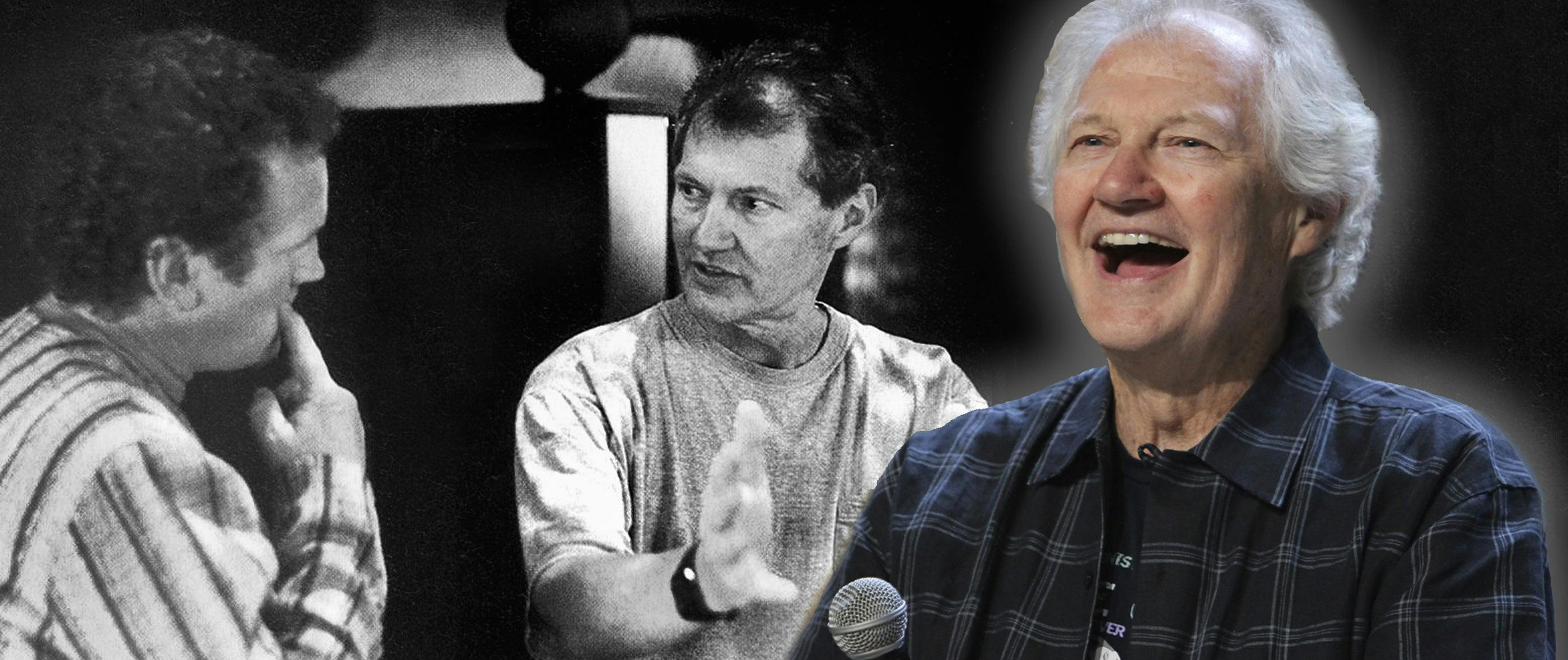
startrek.com
Over the course of StarTrek.com’s weekly interviews with actors-turned-directors, we’ve been talking to series regulars who settled into the director’s chair: Roxann Dawson, Jonathan Frakes, Rene Auberjonois, Tim Russ, Robert Duncan McNeill, etc. Today, we chat with Andrew Robinson, who parlayed his recurring role as Garak on Star Trek: Deep Space Nine into the opportunity to direct the DS9 hour, “Looking for par'Mach in All the Wrong Places,” and a pair of Voyager episodes, “Blood Fever” and “Unforgettable.” We sat down with Robinson over breakfast during the recent Star Trek Las Vegas event, and here’s what he had to say…
You’d directed theater before you were on DS9. When did it pop into your head that you wanted to direct DS9, and how did you approach Rick Berman?
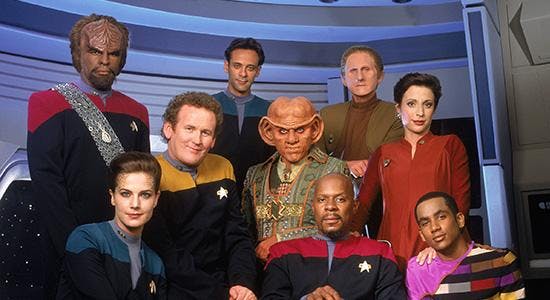
Well, it's a funny story. I wasn't a regular on DS9, but they paid me well enough so that I could pay bills, which gave me the opportunity to start directing theater, which I did with my company. Right off the bat, I won two L.A. Drama Critics Awards for Beckett's Endgame and Harold Pinter's Homecoming. I was the first double winner in one year for two plays, and I knew that the L.A. Times was going to do a big feature on me, so, the morning the Times article came out, I called Rick. I said, "Check the L.A. Times, Rick. And also, can I direct an episode?"
To which he replied?
"Come in. Let's talk." And he agreed to let me direct.
The actors-turned-directors went through the unofficial directors’ program. Take us through your memories of doing that.
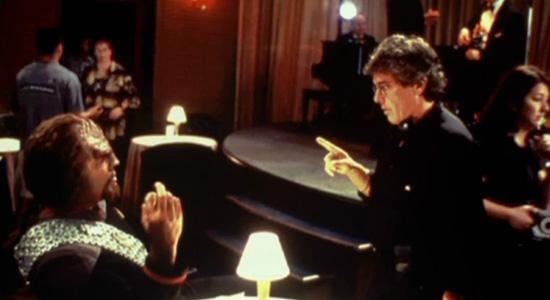
It was like going to school. Directors like Les Landau, they just let me come in. I went through the entire process, from the initial meetings through the editing process. It was great. I’d done some of that before, because I had been flirting with this. I had a friend who was a director, and I sat in with him. But this was thorough. Les loved teaching. He'd sit down and say, "OK, this and this and this and this." Very knowledgeable. He had a lot of experience. It was invaluable, working with him.
What was your reaction when you got the script for “Looking for par’Mach in All the Wrong Places”?
It was a great script. I believe it was Ron Moore's. It scared the hell out of me, because suddenly, it was real. This was going to happen. I did all my due diligence. I broke the script down and got my shot lists. That all went well. It was the first day of shooting which was one of the worst days of my life.
How so?
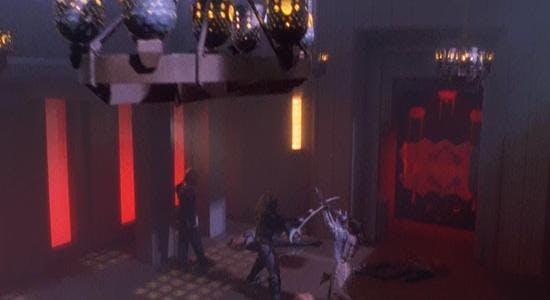
There was this set they had, this huge Klingon hall. I don't know what the hell it was. But it was a huge set that cost them a lot of money, and they had to use it, I guess to get their money’s worth, or something. It was this cavernous goddam place. I decided, “OK, I'm going to do this long shot, in which we dolly in.” Jonathan West says, "OK." They spent the entire morning lighting it. This was my inexperience, of course, but to light a huge space takes an enormous amount of time, especially in one shot, if you want to start wide and then come into a sword fight. It was horrible. On the first day, I was half a day behind. Then, I panicked. Literally, I panicked and froze. I also lost my sense of angles, because it was a fight. I lost more time with that.
It came out fine. So, how did you recover?
It did come out fine. It did come out fine. I wanted to quit, though. I was so traumatized by that day, but I had everyone’s support and we got through it. Then, the other thing that happened that was traumatic is that there was this love story between Worf and Jadzia. They have this testy relationship. Ira (Behr) told me, "Let's get them to kiss, because love scenes, people kiss at the end.” I said, "Oh, absolutely." Well, they wouldn't kiss. The actors would not kiss. I'd do take after take. I'd say, "OK, please, now, will you goddam kiss?" They wouldn't kiss.
They didn't think that their arc warranted it just yet?
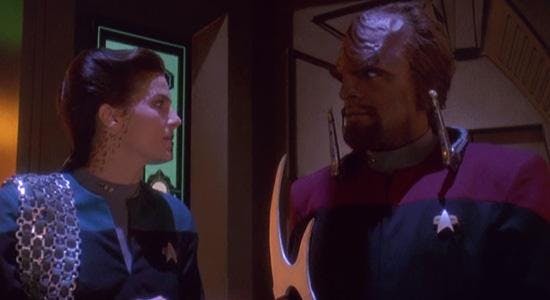
I guess because I was a newbie, they thought, "Yeah, well, let's try something new. Let's not kiss, and let's..." Ira was so pissed at me. "Why? Why didn't you get them to kiss? Goddam it. They're supposed to kiss." I said, "I know, Ira. But… What am I supposed to do, hold a gun to them? Kiss!” But it worked that they didn't kiss. It did. It did. Part of my education was, at the end, when the episode was done, went through the editing process, Ira and Rick brought me up to the office, sat me down. Because I had a contract to do a couple more episodes, Voyager, actually, with (producer) Jeri (Taylor), they said, "OK. This is what you did wrong…” I'm sitting there, and I'm feeling like five years old, going through this, "Oh, Jesus." If I didn't have that experience, learning what I did wrong and right, getting through the problems, and – possibly – if I didn’t have a contract, it would've been one and done for Robinson.
Before we move on to your Voyager episodes, “Looking for par’Mach” had some other interesting elements…
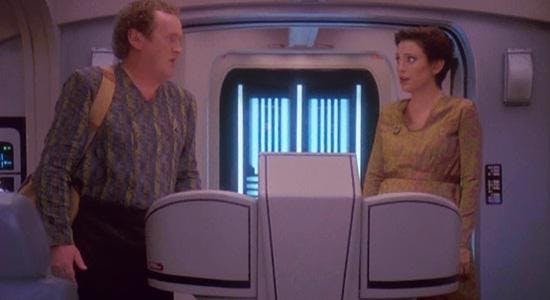
It did. It did. It had the Miles-Kira storyline, and Colm and Nana were great to work with. Then, we had the comedy and the Cyrano de Bergerac thread. There was a lot going on, but I had a great cast, our regulars plus Joe Ruskin, Phil Morris and Mary Kay Adams. Wonderful actors.
After your horrible time on the first day, how pleased were you with the completed episode?
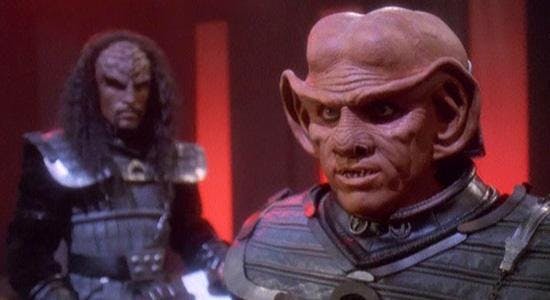
I like the episode. When I saw it, I thought, "Oh, you know? This holds together." It's an odd story. There's weird stuff that happens, but that's OK. It's fitting in this universe. I liked it until I got in the room with Ira and Rick. Then, I'm thinking, "Oh, oh, oh." Then later, I went away and I thought, "OK, maybe there was stuff I missed, pickups or angles or things I’d have done if I had been more experienced.” But still, it was a story told pretty well, and I liked it.
Your first Voyager was “Blood Fever.” What do you recall of that experience?

“Blood Fever,” of the episodes I directed, was the best one. There was an underpinning to that whole thing about lust and this whole thing about obsession. I guess it appealed to my prurience.
How tricky was it to show pon farr without going, pardon the pun, too far?
Well, we went as far as we could, and then I was told, "OK, no more." It's repressed emotion coming out. It's the thing that happens to us when we’re in lust. All rationality just goes out the window, and you'll do anything to satisfy it.
How impressed were you with the performances? You had Alexander Enberg as your main guest, and then Dawson and McNeill...
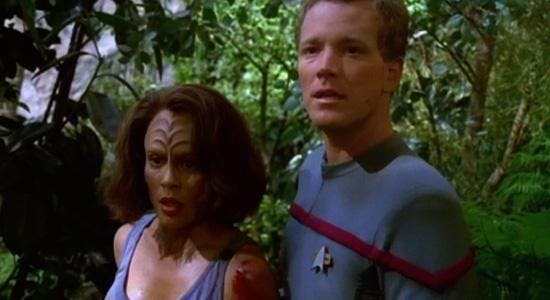
I loved the DS9 guys. I’ll go to war with them. And the Voyager cast, they’d lie in front of a truck for you. They showed me a lot of respect. They were younger, and they were just incredibly helpful solving problems. I'm not surprised that Roxann and Robbie and Tim (Russ) later become directors. I love those actors who, you're working with them, and they say, "You know, I've got an idea for this." They're smart, so it's a good idea. It makes your life easier, and it makes you look a lot better. Tim suggested that great shot with the profile, to get the ears.
Then there was “Unforgettable”…
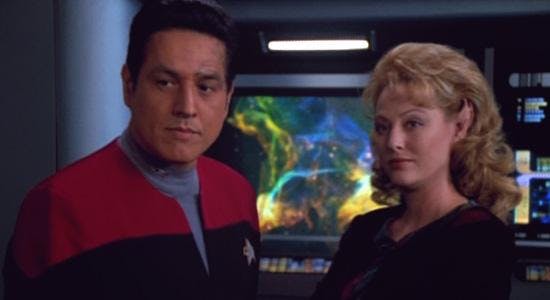
Virginia Madsen. I hope she's well and prospering. I haven't seen her in a long time. She was so sweet, vulnerable and open. Robert (Beltran) truly appreciated that. He was so lucky to have her as a partner in the episode. He's a good actor. I don't know why they didn't use him more. He worked hard on this. He had an opportunity to do something here and he did it. That’s what I remember most about that one, Virginia and Robert. I was pretty happy with the episode.
You went on to become a staff director on Judging Amy, but didn’t pursue directing thereafter. Why not?
I hated sitting at monitors and having writers and producers whispering in my ear, "You're going to... Are you going to...? Are you going to let her play it that way? Wait, no. That line. That line should be funnier." The best shows are not done by committee. They're done by one person's vision, one person making directorial choices. If you start waffling, and you start getting inside the process… As much as the money was fabulous, I said, "Screw that." I went, "If I'm going to direct, I'll just direct theater now." I directed and I taught at USC for 14 years. I just retired from that and now I’m acting again. I actually just did a short film and a play.

